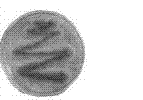(Aspergillus fumigates)Ty-1 and application of (Aspergillus fumigates)Ty-1
A technology of Aspergillus fumigatus and tobacco, applied in the application, chemical for biological control, biocide and other directions, can solve the problems of difficult colonization, poor growth ability of strains, reduced antagonism, etc., and achieves prevention and control of tobacco black shank. Effect
- Summary
- Abstract
- Description
- Claims
- Application Information
AI Technical Summary
Problems solved by technology
Method used
Image
Examples
Embodiment 1
[0046] Example 1 Isolation and screening of tobacco black shank antagonistic bacteria
[0047] 1) Isolation of pathogenic bacteria
[0048] Tobacco black shank was isolated from infected tobacco plants collected in Luoshan County of Xinyang and Wuyang County of Luohe. When the cotton-like mycelium grows around the cigarette block, a little mycelium is picked and purified, and inserted into the PDA slant medium for subsequent use. PDA medium: 200g potato, 20g sucrose, 15-20g agar, 1000ml distilled water, natural pH, pressure 1.05kg / cm2, sterilized at 121.3°C for 20min.
[0049] The micrographs show that the hyphae of the fungus are colorless and without septa; cyst peduncles protrude from the stomata of the diseased tissue, and 1-3 roots are bundled; the sporangia are terminal or lateral, pear-shaped to oval, with papillae, The sporangia can release 5-30 zoospores; the zoospores are nearly round or reniform, colorless, with two lateral flagella.
[0050] 2) Identification of...
Embodiment 2
[0059] Embodiment 2Ty-1 Morphological Observation
[0060] The initial colony of Ty-1 bacteria is flat and white, with sparse hyphae, and the mature colony is black and colorless on the back. The hyphae are colorless and clearly separated, with branches, 3-4 μm in diameter. When mature, the hyphae grow conidiophores, the main trunk and the top of each side branch are stalked, the stalks are in the shape of spindle rods with two pointed ends, and the conidia are spherical or oval like Figure 8 , Figure 9 shown.
Embodiment 3
[0061] Embodiment 3Ty-1 parasitic phenomenon observation
[0062] In the confrontation culture of Ty-1 bacteria and black shank pathogenic bacteria, it was found that Ty-1 bacteria grew vigorously and could produce a large number of short velvet aerial hyphae and black conidia. Ty-1 bacteria can cross the colony junction and directly occupy the growth space of the black shank colony, and can grow on the bacteria, produce spores, and gradually digest the bacteria. Figure 10 shown. The antagonism of the bacterium is manifested as the formation of a bacteriostatic zone or a bacteriostatic zone, which significantly inhibits the growth of pathogenic mycelia, and has obvious nutrient competition and secretion of anti-biological substances to produce antagonism.
[0063] Observing the hyphae at the junction of the colony with a microscope, it was found that the Mycelia of Ty-1 fungus could attach and wrap around the mycelium of blackleg disease as follows: Figure 11 , Figure 12...
PUM
| Property | Measurement | Unit |
|---|---|---|
| Diameter | aaaaa | aaaaa |
Abstract
Description
Claims
Application Information
 Login to View More
Login to View More - R&D
- Intellectual Property
- Life Sciences
- Materials
- Tech Scout
- Unparalleled Data Quality
- Higher Quality Content
- 60% Fewer Hallucinations
Browse by: Latest US Patents, China's latest patents, Technical Efficacy Thesaurus, Application Domain, Technology Topic, Popular Technical Reports.
© 2025 PatSnap. All rights reserved.Legal|Privacy policy|Modern Slavery Act Transparency Statement|Sitemap|About US| Contact US: help@patsnap.com



